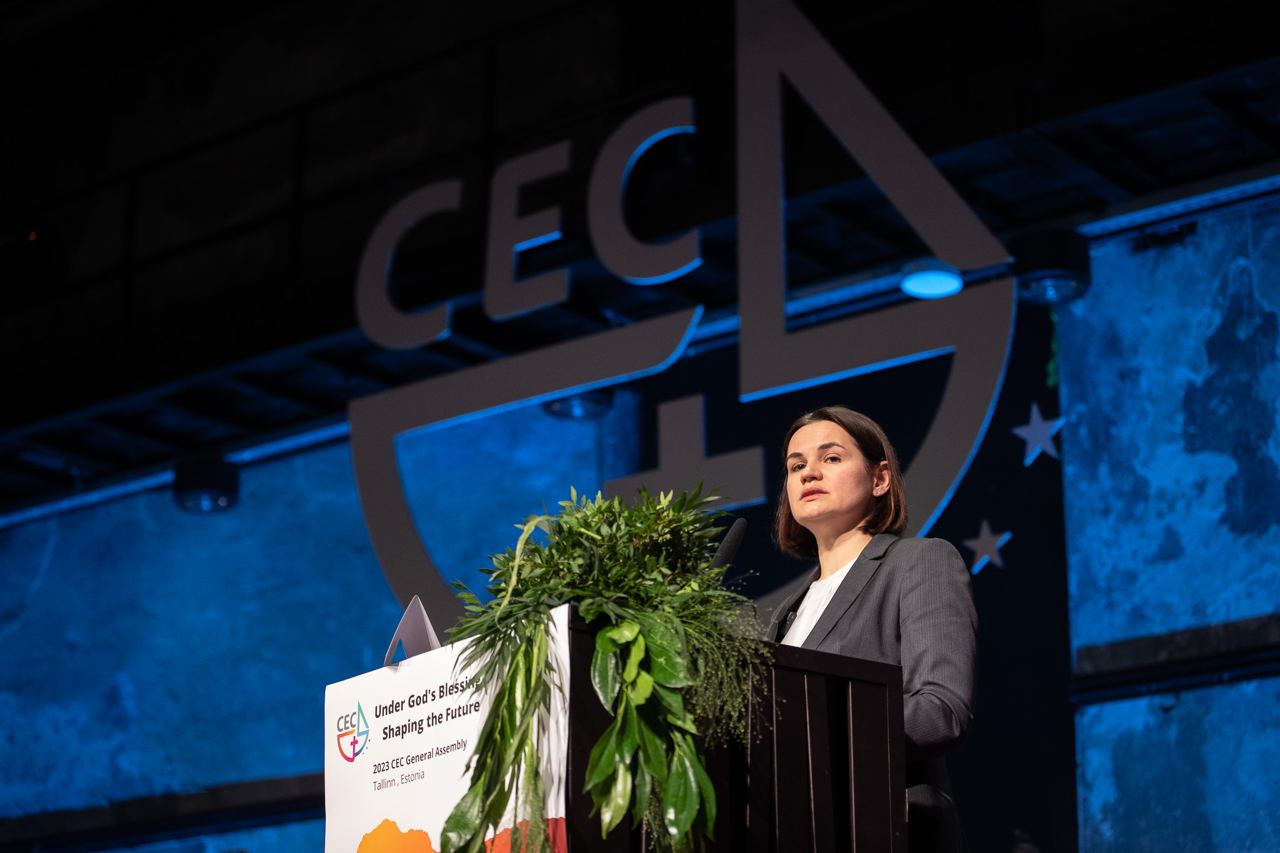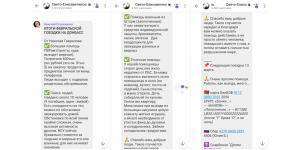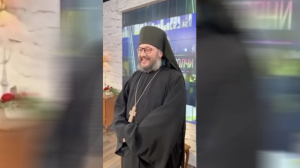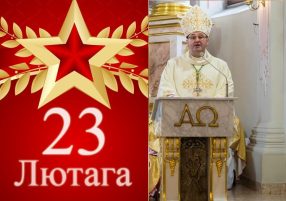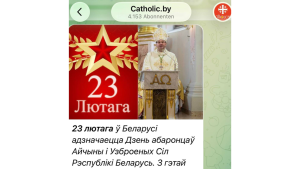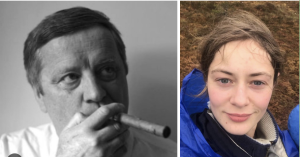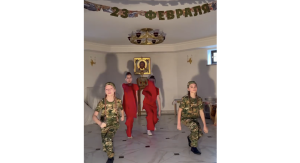Sviatlana Tsikhanouskaya’s keynote address at the CEC General Assembly
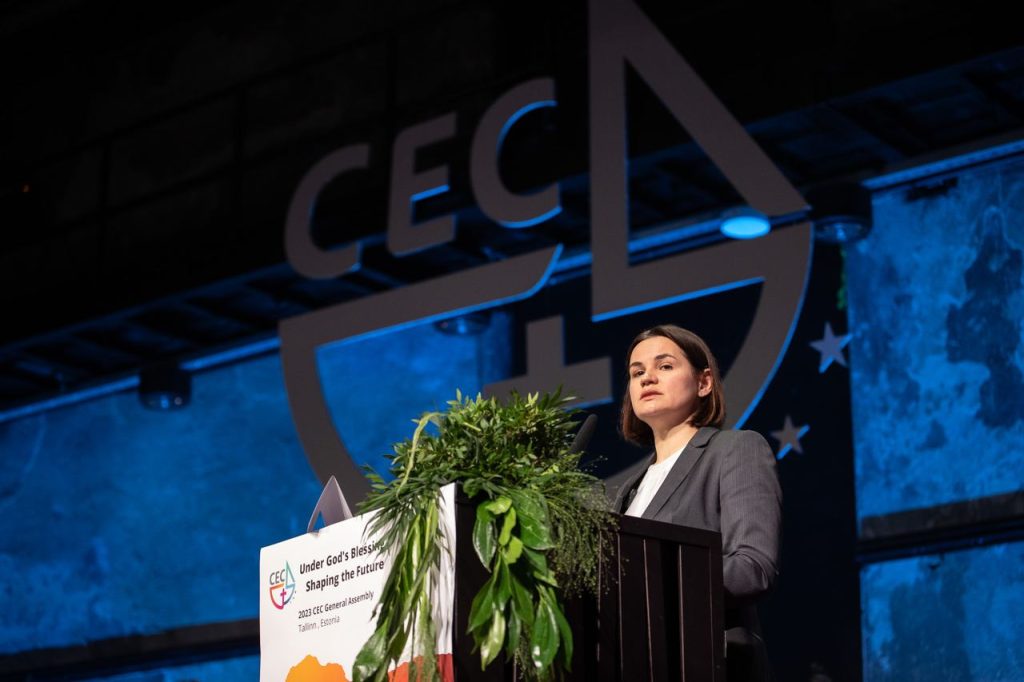
Tallinn, June 15, 2023
Dear President Karis,
Dear Reverend Krieger
Your Eminence archbishop Nikitas,
Dear Prof. Slotte,
Dear Dr. Sørensen,
Esteemed delegates and participants of the General Assembly,
On February 24, 2022, we all woke up in a nightmare: the Russian Federation launched a full-scale aggression against the Ukrainian nation, bombarding and invading them also from the territory of Belarus.
One of the most surreal aspects of this invasion was the fact that it was claimed to be carried out in the name of brotherhood.
In the fire of Russian bombs falling on Ukrainian cities and killing Ukrainian civilians, the idea of the three “brotherly nations” received a mortal blow from those who promoted it.
When empires speak of brotherhood, they tend to strangle lesser nations and countries in their “brotherly” hugs. I sincerely hope that my native Belarus will escape this ordeal.
Genuine brotherhood must be a feeling among equals: it presupposes equality. True brotherhood does not seek to exploit or harm. True brotherhood is not abusive, it seeks empowerment, and not domination.
Can this true brotherhood exist in today’s world?
In the Bible, the history of violence begins with fratricide, with the story of Cain and Abel. You may even argue that every violence, every murder, every taking of life is, in a way, a fratricide. In the end, aren’t we all brothers?
Brotherhood is indeed a profoundly important concept for humanity.
One notable embodiment of this concept is found in the Universal Declaration of Human Rights. Its opening article states, “All human beings are born free and equal in dignity and rights. They are endowed with reason and conscience and should act towards one another in a spirit of brotherhood.”
This declaration emerged from the painful lessons of World War II and the horrors of totalitarian regimes. It was a prophetic call to uphold the inherent worth and equality of every human being.
In autumn 2020, when peaceful protests in Belarus were underway, Pope Francis published his remarkable Encyclical Fratelli Tutti. He proposed a vision of a fraternal society in which the dignity of every person is acknowledged, respected and honored.
A dream of such a fraternal society of solidarity was inspiring us in Belarus in our struggle against tyranny. In promoting democratic transformations, people of Belarus have chosen the path of non-violence against violence; love against hatred; creativity against brutality; solidarity against confrontation.
Among other things, Belarusians’ peaceful protests in 2020 were a manifestation of our firm belief in brotherhood and universal goodness of people.
Traditionally, we speak about brotherhood – but what about sisters and sisterhood? Belarusian philosopher Olga Shparaga called the 2020 protests “Revolution with a female face”[1]. Women played an important and visible role in those events – today, many of them carry on their burden of suffering for Belarus.
Maryia Kalesnikava, Palina Sharenda Panasiuk, Katsiaryna Andreeva, Volha Zalatar, Darya Losik – these are just a few names of approximately two hundred women jailed by the regime. Many of them are practicing Christians. And being a mother and a wife of a political prisoner is not an easy burden, either. I know it, because my husband Siarhei is a political prisoner, too. And I haven’t heard anything from him for more than 3 months already.
Every story of Belarusian political prisoners is heartbreaking in its own way. One of them is the story of the Rezanovich family. Orthodox priest Serhii Rezanovich, his wife Lubou (which means Love in our language) and their son Pavel were arrested as “terrorists” for giving shelter to the opposition activist Mikalai Autukhovich. All three were morally and physically tortured by the police. The 58 years old Lubou was proclaimed “especially dangerous” and sentenced to 15 years in prison. Her husband was given 16 and her son 19 years in prison, respectively.
In 2020, Belarusian women in white became synonymous with the movement itself, symbolizing purity and non-violence. It is worth noting that, on the streets, many Orthodox women in those days were holding icons.
The Roman Catholic bishop Yuri Kasabucki from Minsk compared Belarusian women with Mary, who stood by the cross without fear and looked at the suffering of her Son: “You took the flowers, you came out, you stood, you showed the world, which confused all people… Your smiles—you just amazed everyone; everyone was in shock… You came out and you have started defeating evil with good… You may have defeated the devil without knowing it… Our Belarusian girls, women, our daughters, sisters, wives, mothers, grandmothers—you are heroes of our time”[2].
Back then in 2020, for a couple of days it seemed that the peaceful revolution had already won: for a certain period of time, violence stopped. Many people perceived it as a true miracle. The feeling of the real unity of the nation was in the air. Orthodox Archbishop Artemy Kishchanka of Hrodna said that “Love returned peace and stopped violence” — it became a healing force “from the toxins of evil and aggression”[3].
The idea of brotherhood and solidarity took the form of a famous slogan, “Belarus Belarusu Belarus”. We can translate it as “A Belarusian is Belarusian to another Belarusian”. The formula is a paraphrase of a famous latin dictum, Homo homini homo.
The author of the slogan was Vitold Ashurak, a Roman Сatholic from Lida. When, in September 2020, the regime was arresting him, he was just returning from a prayer holding a rosary in his hand. Rosary, prayer and faith were his only weapons against the violence of the state. Were they not powerful enough to protect him – protect us – from evil?
In 2021, Vitold died in jail. The day of his death, 21st of May, is the international day of solidarity with Belarusian political prisoners. Vitold was 50 years old, and many believe that his death was actually an extrajudicial murder[4]. He was killed by people who rejected his appeal to brotherhood.
Belarusian protesters in 2020 didn’t dehumanize their opponents. And they didn’t expect to be dehumanized by the police, either. They thought, “We are their brothers and sisters, how can they get violent against us? In the end, our demands are legitimate, our hearts are open, our intentions are peaceful. How can you beat that?”
But the regime did. The absolute evil did. For flowers, we got bullets and batons. For love, hatred. With their unprecedented violence against unarmed, defenseless people in cuffs Lukashenka’s henchmen tried to beat the very idea of brotherhood out of Belarusians’ heads.
The evil seemed to retain its power. Unsuccessful attempts to provide democratic transformation resulted in complete destruction of civil society, rule of law, last resorts of freedom. With the beginning of the war against our neighbor Ukraine, Belarus sank even into a deeper darkness of mass repressions, oppression and terror. After the beggining of the full-scale war in February 2022 Belarusians again went to the streets to peacefully protest against the war. They were detained and severely beaten for that. People in Belarus started to be arrested not only for pro-democracy and anti-regime position, but also for the anti-war position.
However, Belarusians have been criticized for the peaceful character of their protests. For many, they were not brave enough, too weak to resist evil.
I can’t agree with this criticism. On the contrary, Belarusians performed miracles of personal courage and moral strength. Why? The answer is simple: we just truly believe in justice, law, morality and conscience.
And the role of people of faith in this firm conviction is crucial. A number of priests of all denominations, were (and are) an important part of the Belarusian freedom movement. It’s truly remarkable, as it’s not always the case in the modern world. Repressive regimes always try to control people of faith – through oppression, manipulations and sometimes even through privileges – buying the loyalty of the church leaders. The dictatorships try to silence church leaders, or even to receive their approval and justification for crimes. And, sadly, they often succeed.
As the Orthodox Archbishop Artemy of Hrodna put it in his letter to Patriarch Kirill two years ago: “Our lay people are more decent and honest than all of us, bishops, who, perhaps, have long forgotten what people of faith should act like!”[5]
Archbishop Artemy was one of those bishops who didn’t forget it. In 2020 his voice against violence, in support of just and legitimate demands of Belarusian people, played a significant role. He also supported priests and lay people of his diocese who voiced their position against dictatorship, against war.
But in many other places the Church leadership added to persecution. Archbishop Artemy himself experienced injustice and lies from his brothers. They took the decision to forcefully retire him from his office on the pretext of his poor physical health. But the true reason was his public position. Trapped by his own church, he passed away on this Easter.
When, in 2020, leaders of Belarusian Churches raised their voice against violence and dictatorship, authoritarian ruler Lukashenka stated that “Churches are not for politics” and threatened those church leaders[6].
When the policy of a state is based on violence against its citizens, we shouldn’t be surprised that those whose very profession is to preach brotherly love and non-violence, become objects of repression.
For the moment, we know the names of at least 16 Roman Catholic, 12 Protestant, 11 Orthodox and 6 Greek-Catholic priests who experienced persecution since 2020[7]. They were detained, imprisoned, fined, threatened, tortured by the regime. Many became refugees.
Today, we know the names of 1500[8] political prisoners in Belarus. The real number is estimated to be about 4000. On average, ten people are arrested daily. What for? Sometimes just for wearing socks of “wrong” colors, associated with protests. Or for liking an anti-war post on social media. In today’s Belarus, this is enough to be proclaimed an extremist and to risk a prison term.
Violence feeds on itself. Once begun, it’s hard to stop. The repressions are systematic, however absurd this dictatorial system is.
On the one hand, dictatorships rely on violence and coercion, military power and manipulation. On the other hand, they prove to be full of fear. They exercise violence because they are themselves threatened by people’s aspirations for justice and peace, by courage, by solidarity, and by readiness to stand in the faith.
When we speak of profanation of such notions as brotherhood, we shouldn’t forget that the dictators like Putin and Lukashenka are champions in this field. Care becomes a mask for abusive control. “Protection of traditional values” covers human rights’ violations. “Social justice” disguises excessive engagement of the state in all domains of social life. Violent “pacification” stands for genuine peace.
Dictators are often not satisfied with power over their own countries. They have delusions about their global mission. Dictatorships proved to be dangerous not only for the people in the country under their control, but also for the neighboring countries, for the whole region and even continent.
For almost thirty years, Belarus has been a non-nuclear country. In an unprecedented gesture of humanity, it gave up its nuclear power – in the name of peace in the region and in the whole world.
Today, the dictator brings the nuclear weapons back to Belarus. In case there is a threat to his personal security and power, he will “not hesitate to use them”, as he said two days ago. He is happy to have a death’s instrument in his hand, and he’s ready to spread death around him, even if it means putting his own countrymen under strike.
It’s especially tragic in Belarus, as our nation is a Chernobyl survivor. I’m myself is a Chernobyl kid. We remember what the nuclear catastrophe meant for the environment and for people’s health. But dictators don’t care: for them, people are just resources. If they don’t care for people’s lives, how would they care for air, water, or nature?
As I speak, all this is being destroyed in Ukraine by the war. Two days ago, a Ukrainian Orthodox priest, 72-years old Mykola Palahniuk from Kherson region, was killed by a Russian missile right in his church. He was distributing humanitarian aid to those affected by the flood, which happened after Russians blew the Nova Kakhovka dam. His church was damaged too. This tragedy shows how the Russian aggressor together with a puppet regime in Minsk is taking human lives and destroying spiritual, moral and cultural values, at once destroying the material and natural ones.
By their very nature, dictatorships represent a threat to political and social systems, to ecology, security, morality, truth, freedom, justice, peace, and also to human dignity and life.
The full-scale war in which Ukrainian people heroically resist the occupation and defend their country by military means, again raised the question: are non-violent means of resisting domestic and foreign tyranny valid?
Can we still believe in non-violence in the world, where that might mean genocide of the weak and vulnerable? Can we still allow ourselves to stay non-violent, where our neighbors, our loved ones are tortured and murdered? Isn’t this utopia and naivety that you can speak with evil the language of love and good, answering to the bullets by flowers? What Christianity has to say on this matter?
In November 2020 I responded to the Encyclical of Pope Francis Fratelli tutti with a letter[9], in which I asked His Holiness, how we could implement his vision of fraternal society in real life. I still believe that this question is not outdated.
You can’t win a war without winning peace. A military victory won’t be enough without political victory. And political victory, to be viable and long-term, has to be a moral one too. And “moral”, at least in the Christian world, means “non-violent”.
It lays a burden of responsibility on religious communities, ecumenical organizations and interfaith platforms. Are they capable of maintaining their genuine identity and providing a positive contribution to justice and peace in the society, guarding human dignity and freedom?
I truly believe that the voice of the religious communities is meaningful and important. It can be liberating, empowering, healing the wounds, moving the world to reconciliation and unity. It must uncover lies and manipulations of those in power, who misuse religious concepts to reach their immoral goals.
Religious communities, Churches and individual Christians can play a significant role in promoting peace in the society, maintaining hope under tyranny, and contributing to democratic transformations. People, whose faith teaches them not to kill, not to steal, not to bear false witness, who honor God more than political leaders, whose moral strength is empowered by their belief – are extremely dangerous for dictatorships and extremely needed in democracies.
Today, people of faith in Belarus need help from their Christian brothers and sisters from Europe and the whole world. The international religious community can do a lot for them. Demanding access to religious services for those in prison, campaigning for their release, organizing pilgrimages and public prayers for Belarus, supporting Belarusian Christians abroad, calling leaders of Belarusian churches to dialogue – all this would make a REAL DIFFERENCE to Belarusians.
It is a pity that none of the Belarusian churches has membership in The Conference of European Churches. Perhaps it is time to try to change that. As Belarus is Europe. And Christianity is a genuine part of our identity.
I would like to finish my speech today with another reference of my letter to Pope Francis, I asked His Holiness to pray for Belarus and its people. And this is what I ask of you today, dear friends: please pray for those who suffer, for our political prisoners, pray for Belarusian people and their liberation from tyranny, pray for Ukrainian people, their freedom and safety. Give your helping hand to your Christian brothers and sisters, who stand up for truth. Don’t hesitate to raise your voices for true peace, true brotherhood and true love.
Thank you for your attention. God bless you.
[1] Olga Shparaga. Die Revolution hat ein weibliches Gesicht. Der Fall Belarus. Suhrkamp, 2021.
[2] Sermon of bishop Yuri Kasabucki, General Vicar of Minsk-Mahilou diocese of the Roman Catholic Church of Belarus, 5.09.2020 (in Belarusian). https://belarus2020.churchby.info/kazan-biskupa-yuryya-kasabuckaga-generalnaga-vikaryya-minska-magilyoўskaj-arxidyyacezii-5-09-2020
[3] Appeal of Archbishop Artemy (Kishchanka) of Hrodna, Belarusian Orthodox Church, 14.08.2020 (in Russian). https://belarus2020.churchby.info/obrashhenie-arxiepiskopa-artemiya-grodnenskogo-i-volkovysskogo/
[4] Statement of the Christian Vision group of the Coordination Council regarding the death in the Škloŭ prison of a political prisoner Vitold Ashurak, 22.05.2021, https://belarus2020.churchby.info/vitold-ashurak/
[5] Report of Archbishop Artemy (Kishchanka) of Hrodna to Patriarch Kirill of Moscow, 9.06.2021. https://belarus2020.churchby.info/archbishop-artemy-spiritual-testament/
[6] Лукашенко: церкви, костелы — не для политики, 22.08.2020. БелТА. https://www.belta.by/president/view/lukashenko-hramy-kostely-ne-dlja-politiki-403780-2020
[7] Christian Vision for Belarus. A Monitoring of the Persecution in Belarus of People on Religious Grounds During the Political Crisis. https://belarus2020.churchby.info/monitoring/
[8] 1739 — dissidentby.com
[9] Sviatlana Tsikhanouskaya. “Fraternal Society: A Vision For a New Belarus”. Letter to the Holy Father Francis, Bishop and Pope of Rome, inspired by his new encyclical Fratelli Tutti. 21.11.2020. In: Belarus Knockin’ at the Vatican’s Door, 5-17. Christian Vision, Skaryna Press, 2022.



